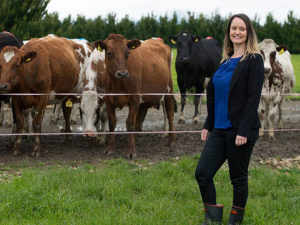Farmer confidence dips slightly, but positivity still dominates
Farmer confidence has taken a slight dip according to the final Rabobank rural confidence survey for the year.
 Rabobank senior agricultural analyst Emma Higgins says the outlook for dairy and meat for the coming year is positive.
Rabobank senior agricultural analyst Emma Higgins says the outlook for dairy and meat for the coming year is positive.
Rabobank and the ANZ Bank agree that the outlook for dairy and meat for the coming year is positive, but both also have some words of warning.
Rabobank senior agricultural analyst Emma Higgins says as 2022 gets underway, the year "will hold bright sparks, despite headwinds gathering strength" and that it's too early to break out the champagne as elements of 2022 will be "unpredictable".
Higgins says the agricultural sector had also performed well in navigating erratic supply chains and with trade flows holding up well despite the global pandemic, while trade relations with China had remained strong.
"Opportunities abound and NZ remains well positioned on global agricultural markets for the year ahead.
"Other factors set to be positives for the country's ag sector in the year ahead include some easing in urea fertiliser prices and a continuing favourable exchange rate for exporters," she says.
Her counterpart at the ANZ, agricultural economist Susan Kilsby, says meat and dairy are delivering exceptionally strong prices at the farm gate helped along by a weak NZ dollar.
But she notes that on-farm costs are rising quickly and the shortage of labour is now a major constraint for most primary industries.
"The labour shortage means it is very unlikely that all of the fruit will be harvested this autumn and there could be significant delays at meat processors. If labour availability falls further due to a surge in Covid-19 cases then the situation will only worsen," Kilsby says.
ANZ says it's optimistic about dairy commodity prices, noting that global dairy prices have climbed to lofty levels, bolstered by tight supply, but says it's debatable how long these prices will last. It notes that milk supplies are not likely to expand quickly any time soon.
"We are less confident that prices will holds at these levels next season. Therefore we have recently revised up our milk price forecast for the 2021-22 season to $9.30/kgMS (from $8.80), while our forecast for next season has been revised up more modestly to $8.40/kgMS," Kilsby adds.
Rabobank says prices will continue to rise in the face of declining global milk supply, which they say should result in another profitable year for NZ dairy farmers despite the rising costs.
"In respect of beef we expect farmgate pricing to remain elevated above the five-year average in 2022, supported by constrained global beef supply and strong demand from China and the US," says Higgins. "In the case of sheepmeat, we believe that steady demand from China in particular will likely support elevated farmgate pricing over the coming year, despite an expected lift in global availability of sheepmeat."
Finally Rabobank anticipates orchard-gate returns for kiwifruit are expected to remain elevated in 2022, off the back of strong consumer demand. Significant changes to licence areas and the tender process will me made in 2022.
For its part, the ANZ says exceptionally strong international prices for lamb are bolstering the returns farmers are receiving for finished lamb. It says farmgate returns for lambs typically drop sharply after Christmas when more new-season lambs become available, but says this season, a combination of high international prices, a softer NZ dollar and fewer lambs available for processing due to dry conditions is keeping prices higher for longer.
It says the prices being achieved in international markets for lamb cuts are staggering, although other meats and dairy proteins are also priced at very high levels.
In regards to beef, ANZ says markets have started 2022 positively as tight global supplies continue to support prices both internationally and locally.
It says farmgate prices for all grades of beef for January were the highest ever recorded for this time of the season, but notes that demand for store cattle has waned as dry conditions start to prevail and wait times for processing cattle grow.
The ANZ report highlights the issue of the labour shortages in the horticulture sector and foresees problems with a record amount of fruit to pick and fewer people to pick it. The report points to the challenges the kiwifruit sector faces with increased production, labour shortages and likely shipping problems, although Zespri has done much to minimise the risk in this area.
Overall, both the ANZ and Rabobank paint a similar picture for the next 12 months, with a mix of positive signs, challenges and the uncertainty of Covid.
Changed logos on shirts otherwise it will be business as usual when Fonterra’s consumer and related businesses are expected to change hands next month.
Reflecting on the past year, Horticulture New Zealand chief executive Kate Scott says there has been a lot to celebrate.
Ministry for Primary Industries (MPI) Director General Ray Smith is giving a big shout-out to the horticulture sector, especially kiwifruit.
Early forecasts for New Zealand's apples and pears point to a standout season marked by exceptional fruit quality and high pack-out rates.
Tickets are now available for Beef + Lamb New Zealand’s (B+LNZ) Out the Gate, returning from 19-21 May 2026 at Te Pae, Christchurch.
Dairy Women's Network (DWN) is welcoming AgriHealth as a new partner.

OPINION: Here w go: the election date is set for November 7 and the politicians are out of the gate…
OPINION: ECan data was released a few days ago showing Canterbury farmers have made “giant strides on environmental performance”.